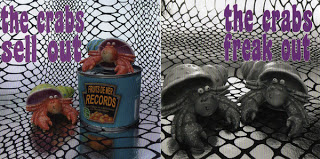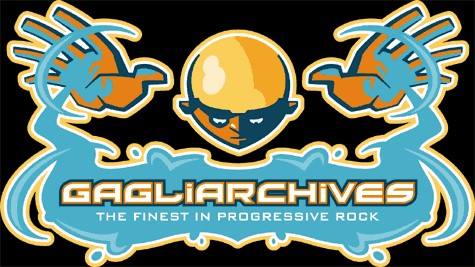UK indie label FRUITS de MER Records have been a going concern for a few years now, cementing their place in the market with their own particular brand of limited edition vinyl only releases. One of their slightly unusual habits is to produce some material aimed more or less exclusively towards their firmest core of buyers, and the most spectacular of their productions to fit this description is their final release of 2012: A double album, CD only on this occasion, that basically is unavailable to the public at large. Instead a select few of their most dedicated buyers and a select few reviewers was given the pleasure of enjoying this particular production. For free. I’m not aware of too many other labels laying down this much effort for what is basically a Christmas present to their most dedicated supporters, but kudos to Fruits de Mer for doing so. As far as creating a real emotional attachment to their endeavors, this is a stroke of genius. Especially as most of the people who receive it will know how much this production have cost in terms of time and money to put together.
The first disc of this dual package has been named “The Crabs Sell Out”, and as one might expect from that choice of description the whooping 17 tracks you’ll find on this disc are fairly accessible items, quite a few that wouldn’t have been out of place on regular mainstream daytime radio. As usual all contributions generally hold a high quality, just about the only letdown for me personally was the freaked out version of Hoochie Coochie Man towards the very end, Permanent Clear Light’s Tuitsie Fruitsie Ice-Cream Man (Madman Blues). A song that will find it’s audience for sure, but not compatible with my personal taste in music. A couple of more tracks were of the kind I’d describe as pleasant experiences, good music but not to the extent of really impressing. The Bevis Frond’s Not Quite Home with it’s acoustic guitars and vocals dominated verse followed by a harder edged, riff and vocals based chorus is the first of these and The Pretty Things’ rock and roll goes rockabilly with an early 70’s hard rock flavoring Rosalyn the second of these. Both compositions again sure to have it’s avid followers, but to my mind none of these were truly standout features.
But the rest of the material range from good to great to my ears. The Past Tense opens this disc with a delightful psych-dripping guitar theme firmly backed by organ and keyboard effects, while Stay utilize careful psychedelic keyboard effects on top of sitar and guitars taking turns in providing the main psychedelic features on Super Heavy Soul Mammoth Explosion Remix. Sky Picnic have nice Beatlesesque verse parts adding a Tom Petty edge for the chorus, contrasted by a darker toned and more distinctly psychedelic oriented instrumental sequences on Lost Is Found. Anton Barbeau showcase the strength of relative simplicity on Occupy/Divide, where vocals and acoustic guitars dominate the proceedings in an inspired manner with a brooding dark undercurrent catering for the psychedelic tendencies quite nicely. The Seventh Ring of Saturn utilize elegant spacey keyboard details to their slow but tight arrangement on Pillsbury Palace, a subtly distanced affair with a slight detached nature. Jack Ellister combines loose improvised sounding psych instrument breakdowns with darker toned, harder edged compact 60’s tinged rock to good effect, while Rob Clarke & The Wooltones use the buzzing psychedelic guitar solo to good effect following their spoof radio advert and lighter toned, acoustic based start of their creation Are You Wooltoned.
The Lucid Dream provides the first taste of the truly brilliant for me with Hits Me Like I’m Stoned, Live on Dandelion Radio. Complete with raga drones and an elongated feature that should find favor among those who are dedicated fans of 70’s Hawkwind. King Penguin use light toned guitars and gentler psychedelic details on Cedar Hill, with a slight southern rock flavor that gives this effort a distinct US sound. Johnny Vines American Mourning should be a thrill for those truly fond of the good old Mellotron, and utilize an effective build up from light toned simplicity to majestic splendor, with a sound that I’d describe as perhaps more post rock than psychedelic as such, at the most majestic with a slight metal edge to the proceedings. Soft Hearted Scientists pair off light toned vocals and acoustic guitar displays effectively with darker toned vocals and organ, following an initial introduction. Leigh Gregory showcase effective use of sparse arrangements with vocals, acoustic guitars and violin on the mournful, melancholic piece Eleanor. Beau sticks to the same principle of simplicity even more brilliantly on Poor Old Thing, a superb constellation of bass, acoustic guitar and vocals, with barely audible rhythms beneath. Paul Roland’s Adam Adamant also sticks to the simplistic, with sax and trumpet bursts (I think) supplementing plucked guitars and steady rhythms, with a couple of keyboard overlays thrown in for good measure.
The second disc of this set, “The Crabs Freak Out”, comes with an expectation of more challenging material than on the first one. And while quite a few of the 15 songs aren’t your typical freakout items, just about all the most challenging material is found on the second part of this relatively exclusive double feature.
Personally I found this second part to be ever so slightly less interesting than the opening disc however, not due to any details that resides in the quality department though I should stress. As with most other music this is a matter of personal taste more than anything else. Temple Music’s Big Old Sun was a piece I found dizzying and annoying rather than hypnotic with it’s distinct brain-twisting electronic motif oscillating at the start and end, and Palace of Swords’ The Castle Spectre with it’s repetitive, distinct synth theme backed by careful droning keys and percussion grew way too repetitive and bothersome for my personal taste.
In the pleasant but not that impressive department, according to my taste, there’s a few instances as well. Sendelica’s Space Hopper Blues is a nice enough feature, but to my ears more of a typical power trio blues based hard rock affair with subtle space rock effects applied rather than the opposite in expression, nice enough material but lacking the finder details that would elevate it to the level of, say, one of the classic Robin Trower escapades from the early 70’s. Anla Courtis’ Helice de Sauco is a very different piece, and it’s dampened acoustic guitar and electronics freakout one of those items that will have it’s very dedicated audience, but again lacking some finer detail or other to make a grand impression for me. Then there’s Helicon’s two pieces, the elegant piano and guitar combination of Introduction to an Interlude and the psych-drenched counterpart Pollen, fine pieces of music both but too short to manage to create a real impact for me.
The remaining songs all managed to make more of an impression with me however. Vespero’s Another Strangest Thing in the Ocean is a fine display of controlled space rock with improvisational elements included, and Red Elektra ’69’s Ride in the Stars is an item that has the spirit of Hawkwind written all over it, in a good way I might add. Vibravoid use spoken like vocals and a dark, brooding organ to good effect on Random Generated Future, a composition that blend some rather obvious nods in the direction of The Doors with a few select futuristic space rock details. Nice. Vert:x’ Cube Abuse returns to the classic Hawkwind style. The harder edged part of it to be precise, and I suspect a studio recording of this track would reveal quite a few tasty secrets hidden on this live recording. An enjoyable romp nonetheless. The Luck of Eden Hall’s A Drop in the Ocean kicks off with dark toned, fuzz and fuzzy guitars dominating, then shifts towards more of an electronics and keyboards driven affair building up to freakout climaxes. Earthling Society’s In the Garden is a feature I suspect will find most favor amongst fans of psychedelic folk music, with acoustic guitars, drones and recorders alongside careful percussion, and a second half rising in pace and intensity alongside female moans. A song where the word climax is sure to be used in descriptions and perhaps even in a few personal experiences for some listeners. Psychedelic music and the realm of the erotic aren’t items commonly combined, at least not these days, but those eager for music celebrating the more intimate parts of existence should take notice of this one. Hills Have Riffs’ Remembering is a much more grounded affair, with a dual layer of acoustic guitars supplemented by a subtle brooding drone and careful guitar solo details, a tad repetitive but establishing a nifty and compelling mood and atmosphere still. Finally there’s Language of Light’s Nancy’s Song to Psyche, opening with spoken female words, a dark drone as undercurrent and echoing guitar licks, developing into a smooth space and freakout-tinged affair sporting echoing fragmented spoken words, a distinct bass guitar motif beneath, an effective organ backdrop and some odd but suitable rhythm details. A hypnotic affair that manage to survive the disturbing, jarring electronic noise that concludes this introspective space journey.
All in all this double album assembled by Fruits de Mer is yet another high quality item in their release history. Those who’d like to get a taste of this production better hope it turns up on ebay at some point however, or that they know someone whose been lucky enough to receive this one in the post. An intriguing collection of music, and with more than 2 hours of it I would have given it the description very good value for money if it had been commercially available. As it isn’t, I’ll have to conclude that those lucky enough to get this double CD in the post got themselves a real treat for Christmas.
My rating: 75/100









